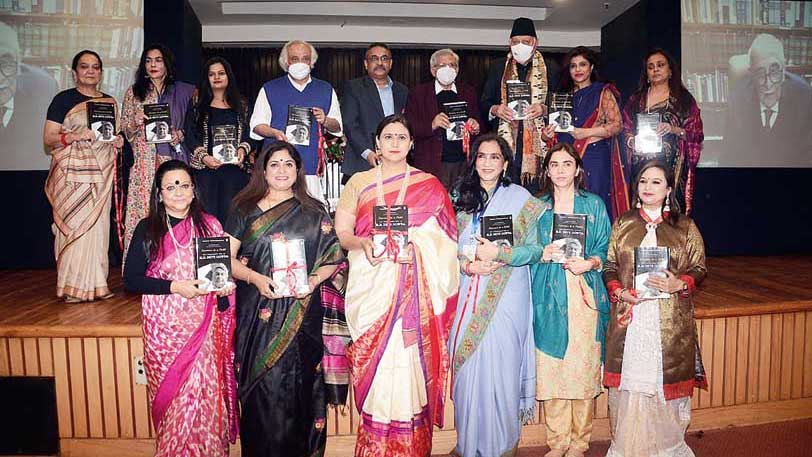A five-day festival of book launches by Kitaab, an initiative of the Prabha Khaitan Foundation (PKF), marked the end of the year in New Delhi. Held at The India International Centre with the gorgeous Lodhi Garden flanking it on one side, the cold Delhi winters felt slightly warmer as Ehsaas women from all over the country joined hands to launch some great books over high tea. The five-day festival saw the launch of the likes of Furrows in a Field by Sugata Srinivasaraju, Hindi Ki Pehli Adhunik Kavita by Sudipti, Law, Humour and Urdu Poetry by Ejaz Maqbool, Satyajit Ray by Raghu Rai, A Bird from Afar by Anshul Chaturvedi, Asylum by Daman Singh and Land of the Gods: The Story of Haryana by Arjun Singh Kadian to name a few. PKF, supported by Shree Cement, has always worked towards upholding the legacy of art, crafts, literature and culture in India through their various initiatives. What was wonderful about this festival was its creation of a free space that allowed discourse not limited by their political allegiance. A platform for free thinking, the first edition of Kitaab Festival had divergent views being welcomed into its corridor and given a stage for expression. The Telegraph spent a wonderful week in Delhi soaking in the brilliance.
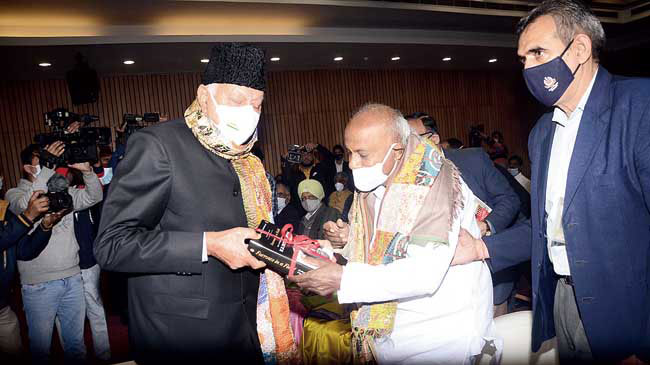
Farooq Abdullah with H.D. Deve Gowda.
Beginning With a Legacy
The event kickstarted with the launch of a descriptive and well-researched book on the former Prime Minister of India H.D. Deve Gowda, who also happened to be present at the event. A culmination of several high-profile interviews by author Sugata Srinivasaraju, this is the first biography of the former prime minister where he shared with the author his personal letters and thoughts. At the launch, in the audience were the likes of Farooq Abdullah, H.D. Kumaraswamy, Jairam Ramesh, Sitaram Yechury, and P. Chidambaram. The session kicked off with an address by Indian jurist Fali Sam Nariman who reminisced working with Deve Gowda, recounting his exemplary work ethics. “It was Deve Gowda’s role in building a political movement around the river Cauvery that led to the revival of the political dominance of the Vokkaliga’s in Karnataka,” he said over Zoom. The former prime minister was also remembered for his erudition in agricultural laws, irrigation laws, civil engineering laws and regulations –– imperatives for leading a country whose backbone is formed on agriculture.
Farooq Abdullah spoke of his leadership skills at one of the most difficult times witnessed in Kashmir in 1995 when four foreign tourists were abducted. “If the external forces that are always at play regarding the state of Kashmir had listened to this great man’s advice, those four people, I am convinced, would have still been alive. I am grateful to you sir and we will forever be, for your efforts –– Kashmir, Jammu and Ladakh,” he said to the man sitting in front of him. His zeal to find a way forward in all situations shone throughout the evening just like the illustrious panel on stage.
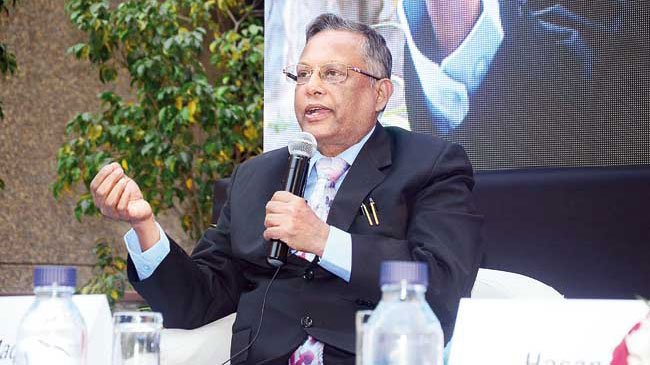
Ejaz Maqbool.
A Surprising Turn
Humour and law found a pleasantly surprising meeting ground at the launch of Ejaz Maqbool’s book Law, Humour and Urdu Poetry. Lawyers have always been an easy target as an industry, for jokes. Maqbool who is an advocate at the Supreme Court of India for the last 36 years, has turned the narrative around with his collection of stories and incidents from the judicial corridors that would have anybody in splits. In conversation with him was Hassan Zia, an information and communications professional with the government of India. The book that took him at least five years to compile now has lawyers writing in to him, sharing their own anecdotes for a possible sequel! Regaling the audience with Urdu couplets in the book, often with self-deprecating humour, this was definitely one of the most fun sessions at the festival.
“In my journey of 36-37 years at the Supreme Court, I have had the good fortune of working with some great luminaries, who would come with great anecdotes in the gravest of situations,” he said. He reminisced a story of a certain lawyer Charles Ross Alston in Allahabad who once told his tall colleague Walter Colvin, “Don’t attempt to put me in your pocket. You would then have more law in your pocket than your head!” Filled with such interesting instances, this book is definitely lined up for a sequel and we hope advocate Maqbool is already on it!
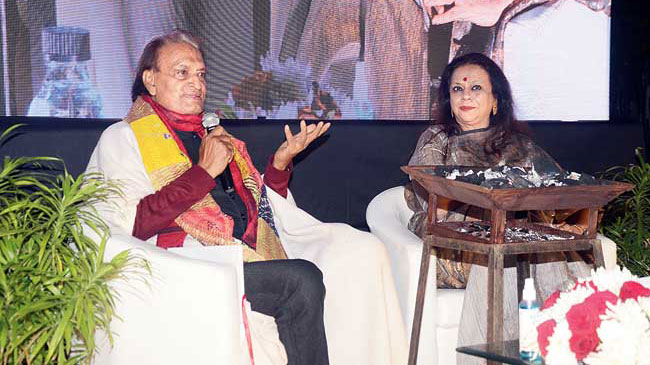
Raghu Rai with Ina Puri.
The Calcutta Connect
Ace photographer Raghu Rai shared a very curious relationship with Satyajit Ray. Having never had the fortune of working together, they still shared counsel with the former lovingly calling the latter ‘Dadu’. Rai had extensively photographed the legendary film-maker which has now been collated into an eponymous book of pictures in his patent black-and-white frames. Rai recounted this fantastic friendship in conversation with Ina Puri on a particularly cold evening. The fireside adda turned warmer with anecdotes of Rai’s interactions with the magnanimous storyteller. It was Puri stumbling upon Rai in his studio pouring over Ray’s pictures that led to her reminding him that it was Ray’s centenary year. “What a coincidence it was! There could have been no better time than this year to look back and commemorate the man as captured through my lens and hence this book,” Rai added. Published by PKF and Raghu Rai Foundation with help from Sundeep Bhutoria, this book is a definite collector’s edition. “An intimate book” is how Rai would want to describe this book that is based on a single shoot that Rai had the good fortune of attending.
The photographer in Rai commented on the experience of capturing stalwarts like Mother Teresa and Ray. “They have so much energy emanating from them that one doesn’t need to try too hard to capture them. There isn’t any posing required. Whichever angle you take a picture from and whoever is behind the camera, becomes irrelevant in front of this energy,” he said. Each picture on the pages of the book is a testament to this statement, making it a must-have for every bookshelf.
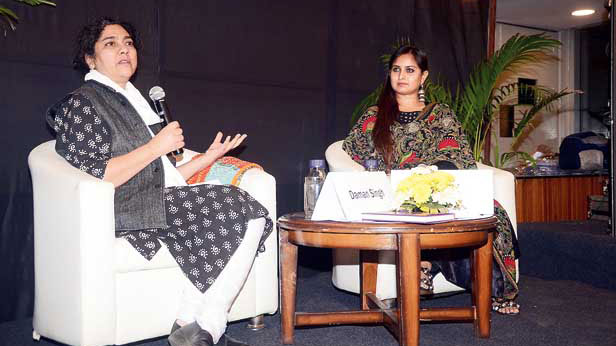
Daman Singh in conversation with Priyanshi Patel, Ehsaas Woman of Ahmedabad.
From Afar...
At the launch of A Bird from Afar by Anshul Chaturvedi in conversation with columnist Suhel Seth and Amitabh Kant, CEO of NITI Aayog, Kant rightly pointed out the variety of subjects that line Chaturvedi’s oeuvre as a writer. From Swami Vivekananda to the Khans of Bollywood to now Subhash Chandra Bose, his erudition has encapsulated them all. A Bird from Afar is a keenly researched novel on Bose’s time in Berlin since 1941 and his efforts to build an army that would march with him to the Indian frontier. Set in the Second World War, this is a picturesque and gritty account of a man whose determination saw no bounds. “What can we say about an author who uses research to then craft a narrative which is mired in fiction? Shakespeare’s political tragedies were also known to draw inspiration from Plutarch’s life. Authors are made up of three things –– craft, compassion and empathy. Chaturvedi does all of this with poise,” summed up Suhel Seth.
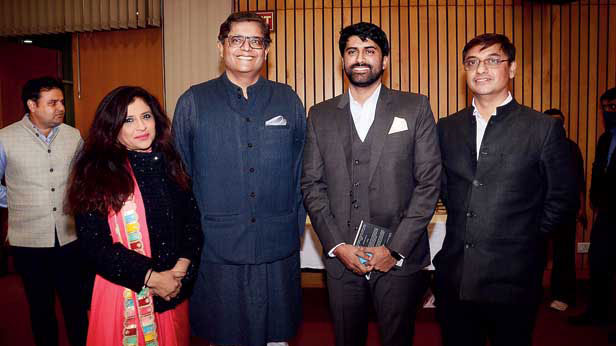
Shazia Ilmi, Jay Panda, Arjun Singh Kadian and Sanjeev Sanyal.
A Fascinating wrap-up
Two final sessions that captured our attention were Daman Singh’s Asylum and Arjun Singh Kadian’s Land of the Gods: The Story of Haryana. While the former is a fascinating account of the history of mental health in India, the latter is a deeply researched book on the state of Haryana replete with history, politics and Vedas. The common backbone of both these books turned out to be deep research. Daman Singh spoke about her love for writing and the trials and tribulations of presenting keen research in a palatable manner to pique the interest of her general audience.
Arjun Singh’s book launch was attended by economist, historian and writer Sanjeev Sanyal and politician Jay Panda. Moderated by Shazia Ilmi, the session proved to break some myths around the state of Haryana and instead focus on the phenomenal growth experienced by parts of the state. What emerges from the book is a look at a state that has endured plenty with invasions by the Persians, Afghans, Marathas and the Mughals. “There are now many stereotypes about the state and it is very easy to say that it is a land where Khap Panchayats are, a land where women are subjected to certain things. However, people tend to forget Haryana is the land where the biggest mounds of Sindhu Saraswati civilisations were found. It’s also the land where Saraswati river flowed, where the Vedas were written,” Singh said. “There is an assumption that modern Haryana is some sort of leftover of linguistic partition of Punjab. That sadly does a disservice to the great state and the history of the place,” said Sanjeev Sanyal who helped the author through many versions of the manuscript to eventually launch the book.
As the fascinating week rounded up, we caught up with Anindita Chatterjee, executive trustee, PKF on the successfully concluded Kitaab Festival. “The festival has launched several books in five days. We have savoured books in three different languages, English, Hindi and Urdu, within a short span of time. It provided us with a unique opportunity to know the literature as well as its author from various walks of life and to have direct discussion with them,” she said. “The cold month of December came alive with this exciting festival. Over a span of five days we had an interesting and diverse array of authors from across the country. This one-of-its-kind boutique festival was well attended and left the culturati and literati of the capital thirsting for more,” added Neelima Adhar, Ehsaas woman of Delhi. We couldn’t agree more!
